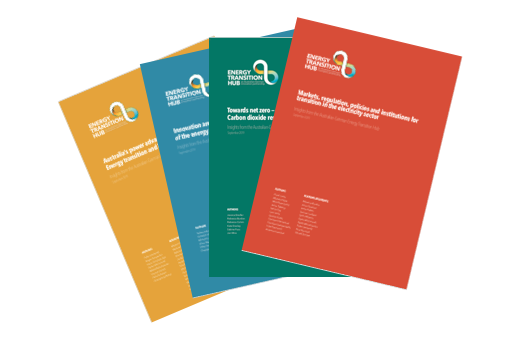
Energy transition is happening globally and in Australia and Germany. It is occurring in response to rapidly changing technology costs and as countries move to implement policies in line with the Paris Agreement goals. This transition poses policy and technological challenges. If managed well, it can also deliver great economic opportunities in both Australia and Germany.
Insights about the implications of the global energy transition for Australia and Germany that have become evident from the Energy Transition Hub’s work include:
- Rapid deployment of renewables in Australia is an essential part of a cost-efficient transition to a net-zero emissions economy. There is the potential to create an export industry based on Australia’s renewable energy resources (as much as, or even more than, doubling Australia’s domestic electricity demand).
- Substantial and complementary export opportunities emerge for Germany and Australia as a result of the move to energy networks powered by renewables, electrification of other sectors of the economy, the transition to zero emissions synthetic fuels and growing demand for zero-emissions metals and energy intensive goods.
- Australia, with its plentiful wind and solar energy resource, available land, and stable regulatory and institutional environment, is well positioned to become a leading exporter of renewable energy and renewable-based energy- intensive goods.
- Germany, as a leading manufacturer and engineering innovator of energy transition technologies, can benefit from an increasingly global deployment of technologies for renewable energy transformation, conversion and the electrification of energy end-uses.
- Large-scale carbon dioxide removal (CDR) is another essential component of any transition that limits warming to 1.5°C, or even to 2°C, unless the pace of mitigation to 2030 increases significantly. CDR is needed to complement the transformation in other sectors: it is not an alternative to rapid deployment of low-emissions technologies across the economy. CDR could create opportunities for Australia as a source of nature-based CDR solutions, bioenergy with carbon capture and storage (BECCS) or direct air capture with CCS (DACCS), and for Germany as a provider of carbon capture and utilisation (CCU) technologies.
- Policy has an important role to play. A cost-effective, timely energy transition that unlocks the potential for new industries, supports affected regions, and protects eco-systems is not guaranteed – it is an outcome achievable in both Germany and Australia with effective policy.
Recent work on these issues is summarised in a series of papers that cover:

